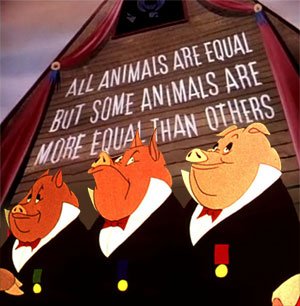Another day, another headline telling us we'll not retire until we're past 70. What assumptions are these based on?
- Yesterday headlines about the government taking your money when you're old to pay for social care.
- Another headline about longer waiting times in hospital, or 'drug rationing', with certain treatments not available in parts of the country.
- Another headline about changes to the pension rate (you'll get less, not more....obviously)
The underlying assumptions we are all programmed with are: I pay my tax, I receive services from the government as required. This is an unspoken assumption of a social contract, an agreement between the citizens & government. But is there such a thing?
I like the idea in anarchist philosophy that a contract is only valid if it's entered into voluntarily by the two parties involved. This 'social contract' doesn't meet that definition, you have no choice, you'll pay the tax whether you want to or not. The govt. side of the contract is backed-up by force.
Secondly, I'd argue that a contract is only valid if it explicitly states what each party needs to do, and the outcome they'll get.
- i.e You sign a contract to work for me, I'll pay you $20-an-hour & you'll work for me for 30 hours a week.
It's explicit, both parties know what's expected (and both can stop the contract if they feel it doesn't suit them anymore).
Again, the 'social contract' doesn't meet this criteria. You are forced (on threat of state violence) to pay your tax (which can change year-to-year on the whims of the government), but the government's side of the contract is variable, they can change it whenever they like (and they do).
This all sounds like a terrible idea!
Older people (people in their 60s & 70s now) have benefited greatly from the 'social contract' which sprang up from the ashes of world war 2. They put in a little bit of tax and over the years have been given massive benefits (on top of the astronomical rise in the price of their houses due to more government interference & a severe restriction on housebuilding while the population grew rapidly). However people in their 20s & 30s now are paying taxes and will be expected to receive MUCH lower benefits (in fact I'd argue they'll likely receive considerably less than they put in over their lifetime).
There's two reasons for this:
1). Demographics. Back in the 1950s, 60s, 70s there were LOTS of tax-paying workers & few retired people. This meant LOTS paid in, but relatively few needed benefits. This has rapidly, though entirely predictably, changed. So we now have far fewer people in their 20s & 30s working (and paying taxes), but FAR MORE retired people claiming benefits (Pensions, care in their home, medical care).
2). The government pissed the money up the wall. Instead of being prudent & putting aside a portion of taxes to pay expected costs in the future, they just spent it (often very inefficiently). If each of us had a little 'pension pot' that grew throughout our working lives, protected from anyone dipping their hands in it, then there'd be no problem.
The result is: we've been sold an illusion, a delusion... an imaginary social contract that will never come to pass. I'm reminded of George Orwell's book Animal Farm (an allegory on the perils of communism) where the pigs took over a farm from the humans, with the promise that the profits would be shared equally between all the animals. For example that after the horses worked hard for the benefit of all, they'd enjoy a beautiful retirement in the orchard. What actually happened was, after the poor horses worked themselves hard until they were of no further use, they were shipped off to the glue factory. The analogy is obvious.

The first person to define 'social contract' was Samuel Locke, a 18th century Scottish philosopher. However I'm not using the term in the way he intended.
What are people's thoughts on this & what's the solution? MY solution is to gradually transfer my assets into crypto, away from the grasp or even view of the government. I also have built my business to allow me to practice from anywhere there's an internet connection, I'm not tied to 'place'.
Great post.
I think you are correct to put a substantial amount of your savings into crypto currencies. It's the only form of money that can't be stolen from you by government and you can be mobile with it. It's good to own some gold coins too, but they can be difficult to transport around. You can expect any bank accounts, pensions and future income to be stolen by the state. Even cash under the mattress is a bad idea, as it will be stolen by the theft of inflation and the eventual outlawing of physical coins and notes.
Look at Venezuela today, this is where we are all headed. The end game of collectivism approaches. The wise see the writing on the wall and make preparations now.
Good luck bro.
+1
"What if I told you ..." 65% of the jobs our children will be doing do not yet exist [according to the current rate at which new professions are being invented].
The whole landscape is an unknown.
I feel very positive that people will no longer shuffle along in this blind trap. Seeing 'the matrix' is the first step.
You see it and free yourself from it.
Well said Alan. Totally agree and I'm walking in same direction!
I wish more people would break the social contract that we have been forced into. Imagine the whole country decided not to pay taxes in april one year.... Pipe dream but man that would be great.
Friend, it sounds to me as if the steps you are taking are excellent.
The core solution is to lose our belief in human government.

😄😇😄
Nailed it bro'
The social contract is just a religious construct, and we're apostates.